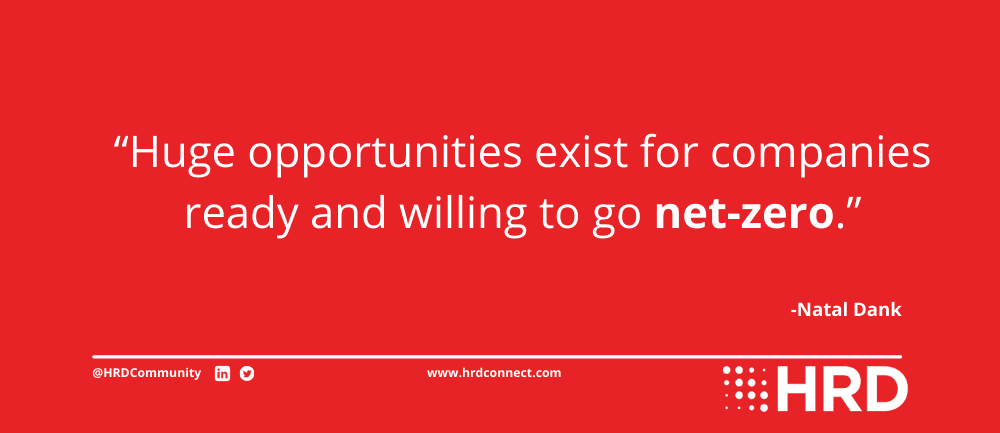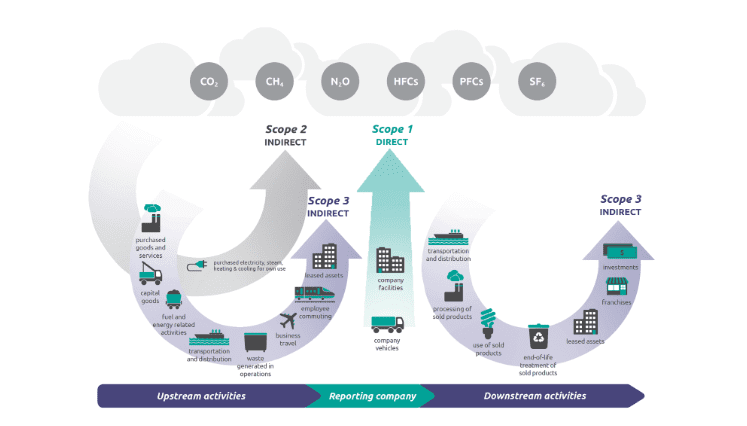How HR can help business go net-zero
- 7 Min Read
In this article, Natal Dank explains the link between net-zero and ESG and explores how HR can get started in helping businesses go net-zero, from people strategy to brand values and culture.
- Author: Natal Dank
- Date published: May 31, 2022
- Categories

The need to go net-zero is rapidly reshaping the business world. In a race to reduce greenhouse gas emissions and fight climate change, organisations across the globe are pledging net-zero targets with huge implications for HR and people strategy.
This shift towards a net-zero business model is not just a reflection of changing government policy. Now more than ever people are demanding a social conscience from companies. Increasingly, employees seek a shared purpose with their employer, aligned with their values and a perceived contribution to the wider community. While consumers are making ethical purchases linked to the sustainable actions of brands and their potential impact on the planet.
It’s time for HR to become the corporate activist.
What does going net-zero mean?
Climate change is now an indisputable fact. A result of human activity warming the planet through the burning of fossil fuels and deforestation. To stabilise global heating the world needs to go net-zero, which symbolises the perfect balance between the amount of greenhouse gases emitted into the atmosphere with the removal of these gases out of the atmosphere. With the aim of keeping warming at 1.5 °C countries worldwide have committed to 2050 net-zero targets. The impact has seen most leading companies such as Walmart, Unilever, Amazon and Maersk pledging to go net-zero by 2040, with fossil fuels companies and banks, such as BP, Exxon and HSBC, following by 2050.
How a net-zero EVP attracts the best talent
One of the biggest shifts coming out of the Covid-19 pandemic is a renegotiation of the employee-employer relationship. Increasingly, people are seeking a more human employment deal as the traditional separation between our working lives and our personal, home and social lives become increasingly blurred. Linked to this trend is a need for organisations to build a strong purpose-led EVP (employee value proposition) to attract talent.
Studies show that the need for a shared purpose with their employer is even stronger in younger generations. Gen Z and millennials have higher levels of eco-anxiety and are more likely to seek employment with a brand committed to sustainable business practices. The rapid growth in hybrid working models resulting from the pandemic also means most office-based employees experienced the potential to work in a different and more sustainable way.
The pandemic also served to heighten the importance of climate change for most people. A 2021 IBM Institute for Business Value (IBV) global survey reported that Covid-19 influenced the sustainability views of 93% of global consumers and 71% of all employees and employment seekers now find environmentally sustainable companies more attractive.
In a candidate-led talent market shaped by the ‘great resignation’ the need to align your purpose-driven EVP with a net-zero future becomes critical. However, as recent social media backlash against greenwashing demonstrates, net-zero pledges need to be more than just lip service and equate to genuine actions in sustainability.

Gaining a competitive advantage through net-zero
Huge opportunities exist for companies ready and willing to go net-zero. Recent data shows that the green economy, made up of companies working in clean energy, energy efficiency, water, waste and pollution services, has grown faster than the overall equity market and is now worth more than the fossil fuel sector.
The development of new green skills becomes an essential component in achieving this competitive advantage. So much so that LinkedIn Learning just released a new suite of green skills development programs. Indeed, the scale of net-zero transformation required within companies over the coming decade means all jobs in all sectors need to harness green skills in some way. Not only to drive necessary innovation and new product design but also to help society evolve in fundamental day-to-day activities such as commuting, shopping and eating.
The link between net-zero and ESG
Such talent trends also link closely with the growing influence of ESG (environmental, social and governance) on a company’s operations and market success. ESG constitutes set criteria on which investors base decisions linked to the environmental impact of a business, its relationships with multiple stakeholders including employees, customers, suppliers and communities, and its governance in areas like executive leadership and pay.
HR plays an essential role in helping organisations achieve their ESG ambitions through the key areas of:
- People strategy
- Employee experience and operations
- Governance and reporting
- Skills development and capability
- Brand values and culture
- CSR (Corporate Social Responsibility) activities
- Sounding-board to executive leaders to ensure authenticity
A good example of ESG strategy in action is the attainment of the B Corp Certification, which includes market leading companies such as Patagonia, The Body Shop and Tridos Bank. B Corps are underpinned by a stakeholder-led ethos where employees, customers and community are considered as crucial as shareholders. The financial success of these companies also indicates that a sustainable business model no longer implies purpose over profit.
How HR can get started in helping business go net-zero
While going net-zero can seem daunting there are lots of ways HR can start taking action to help their organisation begin the transition and contribute to a net-zero mission.

Source: WRI/WBCSD Corporate Value Chain (Scope 3) Accounting and Reporting Standard (pdf)
To get started here is a list of HR actions that reflect our area of influence based across the three emission scopes:
People strategy
- Link your company’s purpose and EVP to net-zero
- Evolve your hybrid working or flexible working strategy to decrease emissions resulting from the daily commute
- Review rewards and executive compensation and assess if any CEO and/or executive performance metrics be linked to climate action and net-zero targets
Employee experience and operations
- Update your car policy to cover electric vehicles and set up charging stations for employees to charge their car while at work
- Revise your business travel policy and link decisions to your net-zero mission
- Partner with IT to help the company embrace paperless processes
- Partner with facilities to transition towards renewable energy sources onsite such as solar panels, wind turbines and electric batteries
- Collaborate with stakeholders to transition any company owned vehicles or delivery fleet to electric
Governance and reporting
- Assess how to become a B Corp and partner with finance to make ESG reporting as robust and transparent as your financial or risk reporting
- Link sustainability with corporate governance by establishing a sustainability committee or including ESG criteria for governance committees overseeing topics like risk, audits, health and safety or remuneration.
Skills development and capability
- Add green skills development to your L&D strategy
- Recruit for sustainability know how and cultural fit, for example, add sustainability as a requirement for executive recruitment
Brand values and culture
- Listen and survey employees on ESG and climate change issues
- Act with other companies – for example, many companies are joining The Climate Pledge, a cross-community group of companies and committed to going zero-carbon by 2040
CSR activities
- Take a stand and align your business with specific climate protests and sustainability initiatives
- Support employees who engage in social movements by allowing time off or charitable giving for initiatives that meet set criteria, for example, is underpinned by science.
Sounding-board to executive leaders to ensure authenticity
- Bring critics and voices to the executive
It’s time for HR to be a corporate activist
The need for business to go net-zero is both immediate and essential for the future of our planet. Leading the market with a purpose-driven EVP linked to your net-zero pledge is also critical to attract great talent and gain a competitive advantage. HR has a crucial role to play in helping businesses go net-zero due to our organisational wide influence, governance and people strategy responsibilities. To help the business go net-zero it’s time for HR to become corporate activists and directly contribute to saving our planet.
________________
Natal Dank is the co-founder of PXO Culture where she heads up learning, coaching and community. She serves as director of HR Trend Institute. Natal is seen as a pioneer in the Agile HR movement and is focused on defining modern HR to help organisations build great people experience and operations.




